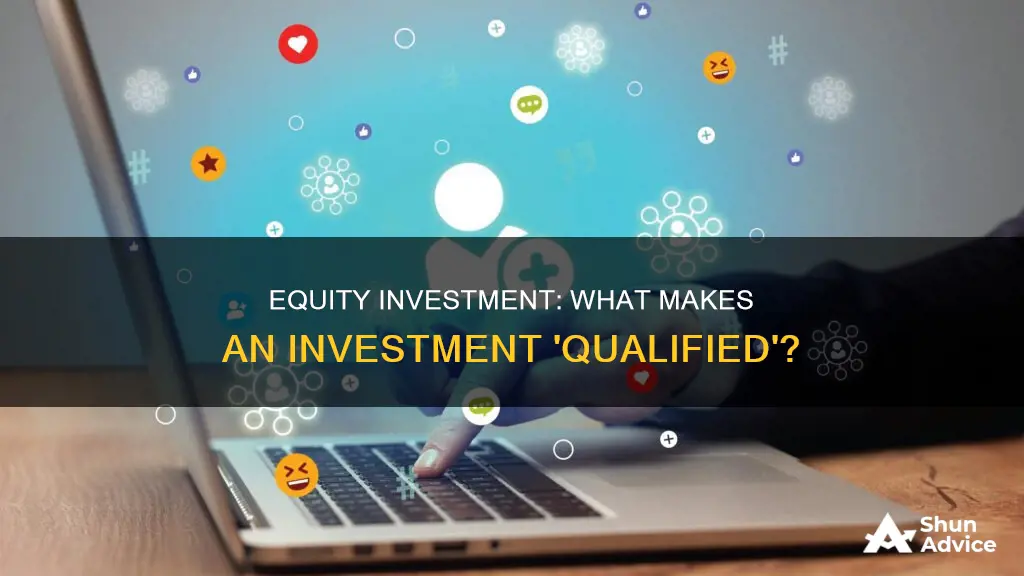
The term qualified equity investment is often used interchangeably with the term accredited investor. It refers to individuals or entities that are legally permitted by the Securities and Exchange Commission (SEC) to invest in hedge funds, private equity offerings, and other unregistered securities. To become a qualified equity investor, individuals must meet certain criteria regarding income, net worth, and qualifications. These include having an annual income of over $200,000, a net worth exceeding $1 million (excluding primary residence), or holding specific professional licenses.
| Characteristics | Values |
|---|---|
| Income threshold | $200,000 individual income or $300,000 joint income for the last two years and the current year |
| Net worth threshold | $1 million, excluding primary residence |
| Investment access | Hedge funds, venture capital funds, private equity offerings, and other private placements |
| Investor type | Individual or entity |
What You'll Learn

Who is a qualified investor?
A qualified investor, also known as an accredited investor, is an individual or entity that is legally permitted by the Securities and Exchange Commission (SEC) to invest in hedge funds, venture capital funds, private equity offerings, and other private placements.
To become a qualified investor, individuals must meet one of the following criteria:
- An annual income exceeding $200,000 for the last two years, or $300,000 when combined with a spouse, and a reasonable expectation of the same for the current year.
- A net worth greater than $1 million, either by yourself or combined with a spouse, excluding your primary residence.
- Possession of a Series 7, Series 65, or Series 82 financial securities license.
Entities may also qualify as accredited investors if they meet certain criteria. Examples include:
- Corporations, partnerships, LLCs, trusts, and employee benefit plans with assets or investments exceeding $5 million.
- Retirement plans or trusts with at least $5 million in assets, provided they are directed by a "sophisticated person" with knowledge and experience in financial matters.
- Registered brokers, dealers, advisors, insurance or investment companies, banks, and savings and loan associations.
It is important to note that there is no formal application or government certification to become a qualified investor. Instead, it is the responsibility of the investment issuer to determine whether an investor meets the criteria before allowing them to participate in specific investment offerings.
Qualified investors have access to investment opportunities not available to the general public and can take advantage of the potential for high returns and increased diversification. However, these investments also come with higher risks, high minimum investment amounts, and illiquidity.
India's Investment Woes: Political, Economic, and Social Factors
You may want to see also

What are the criteria for qualification?
To be considered a qualified equity investor, there are several criteria that need to be met. These criteria are set by the Securities and Exchange Commission (SEC) and are related to income, net worth, and qualifications.
Firstly, a qualified investor must meet certain income requirements. For an individual, this means having earned income exceeding $200,000 in each of the two previous years. If combined with a spouse, this threshold increases to $300,000 for the same period, with a reasonable expectation of the same income level for the current year.
Secondly, qualified investors must also have a certain net worth. This is defined as having a net worth greater than $1 million, either individually or combined with a spouse. Importantly, the primary residence is excluded from this calculation, and only liquid assets that are exclusively for investment purposes are considered.
Additionally, qualified investors may also include individuals who hold specific professional certifications, designations, or credentials. For example, individuals with a Series 7, Series 65, or Series 82 license are considered qualified investors.
It is also worth noting that the criteria for qualification may vary depending on the specific investment opportunity and the jurisdiction. For instance, in the EU and Norway, there is a qualitative test to evaluate the individual's expertise and knowledge, as well as a quantitative test where the individual must meet certain financial portfolio or transaction size criteria.
Overall, the criteria for becoming a qualified equity investor are designed to ensure that investors have the financial sophistication, means, and experience to understand and accept the risks associated with these types of investments.
Portfolio Net Assets: A Concern for Investors?
You may want to see also

What are the benefits?
The benefits of being a qualified equity investor, also known as an accredited investor, include access to unique investment opportunities not available to non-accredited investors, high returns, and increased diversification in your portfolio.
Accredited investors are individuals or entities that meet certain income, net worth, or licensure criteria. This designation allows them to access certain private market investment opportunities not available to many retail investors. The primary benefit of being an accredited investor is that it gives you a financial advantage over others. Because your net worth or salary is already among the highest, being an accredited investor allows you access to investments that others with less wealth do not have access to. This, in turn, could further increase your wealth.
These investments could have higher rates of return, better diversification, and many other attributes that help build wealth, and most importantly, build wealth in a shorter time frame.
One of the simplest examples of the benefit of being an accredited investor is being able to invest in hedge funds. Hedge funds are primarily only accessible to accredited investors because they require high minimum investment amounts and can have higher associated risks but their returns can be exceptional.
Qualified investors, also known as qualified purchasers, are defined by the Securities Act of 1940. Qualified purchasers are only qualified by the size of their assets, which must be greater than $5 million.
Qualified purchasers typically have broader investment opportunities than accredited investors. If an investor meets the $5 million investment threshold for qualified purchaser status, they will also typically meet the $1 million net worth threshold for accredited investor status, meaning they can invest in 3(c)(1) funds.
Qualified purchasers can also invest in another private fund type: 3(c)(7) funds. 3(c)(7) funds can accept up to 2,000 qualified purchasers, compared to the 100 or 250 accredited investors allowed by 3(c)(1) funds.
In summary, the benefits of being a qualified equity investor include access to a broader range of investment opportunities, the potential for higher returns, and increased diversification. These advantages can help build wealth more quickly and effectively.
Investment Management Fees: Are They Deductible on Form 1041?
You may want to see also

What are the drawbacks?
While qualified equity investments open up new opportunities, they also come with several drawbacks.
Firstly, high risk is involved in these types of investments. The strategies used by many funds carry a higher risk to achieve the goal of outperforming the market. This means that there is a significant possibility of losing a large amount of money.
Secondly, qualified equity investments typically require high minimum investment amounts. Accredited investors often need to commit a few hundred thousand or even a few million dollars to participate in these investments. This high level of financial commitment can result in substantial losses if the investment performs poorly.
Additionally, qualified equity investments often come with higher fees, particularly in the form of performance fees, which can range from 15% to 20%, on top of management fees.
Another drawback is the lack of liquidity associated with these investments. For example, while stocks purchased through an electronic platform can be sold at any time, investments in a hedge fund may have capital lock-up periods ranging from a year to five years or more, limiting the accessibility of the invested funds.
Lastly, there is a rigorous verification process for qualified equity investments. Companies are required to take several steps to confirm an investor's accredited status, which may include requesting financial statements, tax returns, W-2s, bank statements, and other documentation. This process can be time-consuming and require the disclosure of sensitive financial information.
Overall, while qualified equity investments provide access to unique opportunities, they also carry significant risks and require substantial financial commitments, high fees, and reduced liquidity.
Understanding SAP's Portfolio Investment Strategy
You may want to see also

How does one prove qualification?
To prove qualification as a qualified investor, one must meet certain criteria regarding income, net worth, and qualifications. These criteria are set by the Securities and Exchange Commission (SEC) and allow individuals or entities to invest in securities that are not registered with the SEC.
For individuals, there are two main ways to qualify as a qualified investor:
- Income: An individual must have earned income exceeding $200,000, or $300,000 when combined with a spouse, during each of the previous two full calendar years, with a reasonable expectation of the same for the current year.
- Net Worth: An individual must have a net worth greater than $1 million, excluding their primary residence.
It is important to note that the same method (single or joint) must be applied to the income test in all three years. Additionally, companies selling unregistered securities are required to verify eligibility by requesting financial documentation such as W-2s, tax returns, bank statements, and other information.
For entities, the following criteria generally apply:
- Corporations, partnerships, LLCs, trusts, and other organizations with assets or investments exceeding $5 million.
- Retirement plans or trusts with at least $5 million in assets, provided they are directed by a "sophisticated person" with knowledge and experience in financial matters.
- Investment advisers (SEC- or state-registered) and SEC-registered broker-dealers.
- Financial institutions such as banks, insurance companies, and investment companies.
It is worth noting that the specific requirements may vary depending on the jurisdiction and applicable laws. Therefore, it is always advisable to refer to the relevant government sources and seek professional advice when determining qualification as a qualified investor.
Equity Shares: Investing in Rajiv Gandhi's Vision
You may want to see also
Frequently asked questions
A qualified equity investment is an investment that has been deemed to meet specific criteria and is therefore eligible for certain tax benefits.
Qualified equity investments often come with tax incentives, such as tax credits or deductions, which can reduce the amount of tax owed. They may also offer other benefits such as diversification and high returns.
Qualified equity investments are typically made by accredited investors, who are individuals or entities that meet certain income, net worth, or licensure criteria. These investors are often considered to have the financial sophistication to understand and accept the risks associated with these types of investments.







